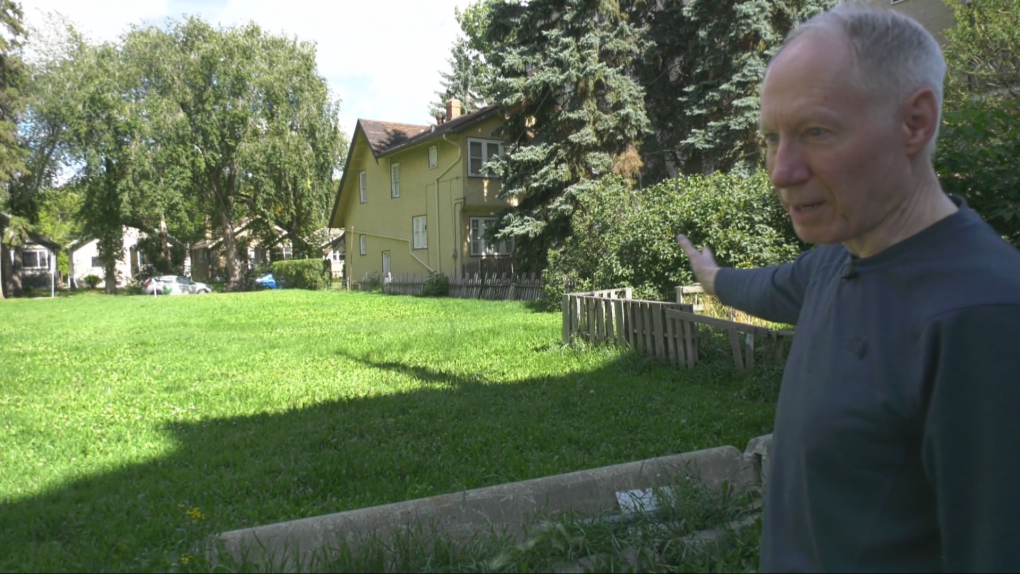A homeowner in a southside neighbourhood says his property is about to lose hundreds of thousands of dollars in value because of the City of Edmonton.
The yellow house in Garneau has stood in Garneau for a century and has been in Brian Peel’s family since the 1950s.
The empty field beside his house is made up of two lots owned by the city, each the size of Peel’s property.
The city plans to build a 34-unit supportive housing development on its land, sandwiching Peel’s home between towering, multi-storey walls.
“My house and property will be permanently isolated,” Peel told CTV News Edmonton on Friday. “The value and utility of it will be wiped out.”
Peel’s lot used to be protected by unique wording in its zoning. It used to be governed by a zoning clause that linked the three properties together, wording intended to avoid the kind of isolation Peel now faces.
The city re-zoned the lots in 2021, in the process removing the clause.
Before then, Peel had been negotiating with the city over the value of his lot. For years, he says, he’s been willing to sell his property to the city so it could build a larger housing project using all three lots, but he said the city didn’t match the independent appraisals for which he paid.
“(They offered) 686,000 for my lot, which is valued at well over $1 million, and that value has gone up, by the way, since the last time it was appraised,” Peel said.
 Brian Peel at the lots beside his house in Edmonton’s Garneau neighbourhood. (Jeremy thompson/CTV News Edmonton)The two sides never reached a deal, and at the start of this year, a new zoning bylaw for all of Edmonton took effect.
Brian Peel at the lots beside his house in Edmonton’s Garneau neighbourhood. (Jeremy thompson/CTV News Edmonton)The two sides never reached a deal, and at the start of this year, a new zoning bylaw for all of Edmonton took effect.
The city’s head of real estate says that change gives Peel more options to redevelop his narrow lot.
“With the introduction of the new zoning bylaw, the city no longer has minimum site areas for higher density development, making the isolation clause obsolete,” Chris Hodgson, branch manager of real estate for the city, said in a statement to CTV News Edmonton .
Peel told CTV News Edmonton the only structure he can build now on his lot would be “like a mini-apartment building, and that structure can only be 12-feet wide.”
He said he feels the city acted in bad faith when it re-zoned and decided to move forward with its housing complex on just two lots.
“They just don’t want to pay what my property is worth,” Peel said.
A property law professor at the University of Alberta says he believes bad faith would be difficult to prove in court.
“As long as the process is followed, there is no recourse to land owners,” law professor Eran Kaplinsky told CTV News Edmonton.
In 2022, the Supreme Court of Canada made a ruling that lowered the bar to establish someone’s property rights have been violated through rezoning. It’s a decision Peel might lean on if he decides to take legal action.
Kaplinsky, however, believes the circumstances in that case compared to the one in Garneau are different.
“That case does not apply to these circumstances. This person has a right to develop. He wants to develop for something more lucrative, and that’s not protected by law,” Kaplinsky said.
With the housing project approved, Peel feels like time is running out before his property’s value evaporates.
He suggested the city move the project to another piece of land it owns nearby, but Hodgson said the city “is moving forward” with development plans on the two lots.
“There is no need and no funding available for the City to purchase Mr. Peel’s property,” Hodgson said.
After trying to handle his concerns privately with the city, the ordeal has left Peel feeling stressed and frustrated enough to go public with it — an example of the challenges homeowners could face under Edmonton’s new zoning bylaws.
Peel plans to keep battling the city even if it means going to court.
“No reasonable person looking at this situation would think this is fair,” he said.